Published Nov 2, 2017
Writer Ted Sullivan Breaks Down "Lethe"
Writer Ted Sullivan Breaks Down "Lethe"
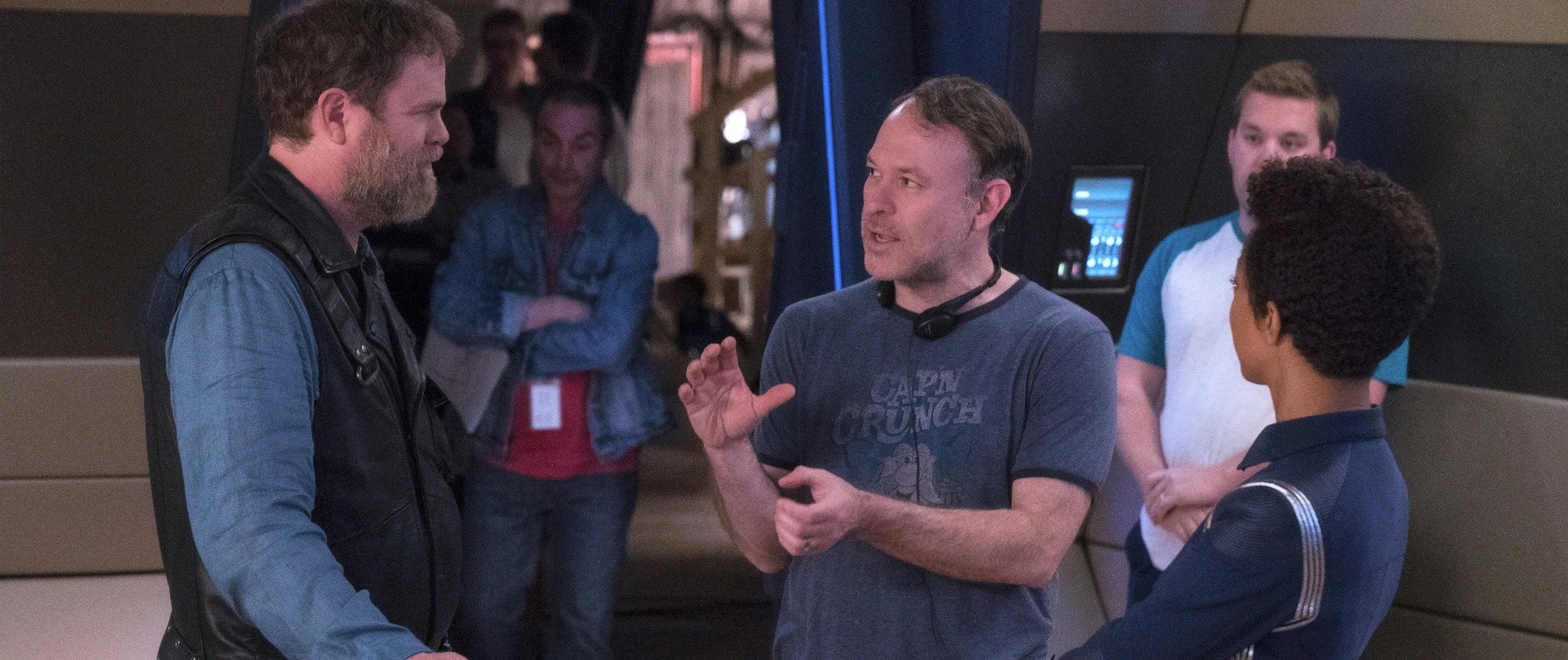
Mission accomplished. Ted Sullivan notched a “Written by” credit – shared with a personal hero of his, Joe Menosky – on last week’s Star Trek: Discovery episode, “Lethe.” StarTrek.com recently caught up with Sullivan, who serves as a Discovery staff writer and co-executive producer, and who counts among his previous credits Law & Order: Criminal Intent, Rizzoli & Isles, Revenge, Supergirl and Pure Genius. Among the topics: collaborating with Menosky, how to pronounce the episode’s title, his satisfaction at Discovery’s renewal, and more. Here’s what he had to say:
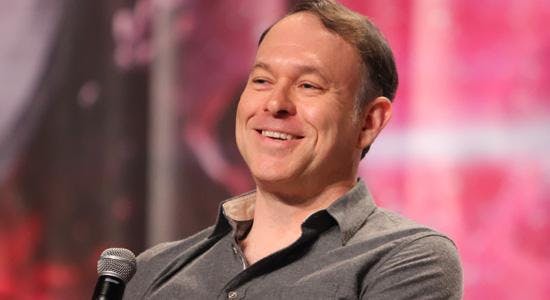
When we met at Star Trek Las Vegas, back in August, nobody had seen anything yet. So, how has this experience been so far?
We were shooting episode six, and I had been on the show since the last day of November, 2016, so the world hadn't really seen anything other than the trailer. But we have been so deep in it. I think Sonequa had only just recently been announced, too, which was such a weird experience of being on the show and having the lead but not being able to say that we have the lead. It's a unique beast, this show. You're jumping onto a moving train that's going a thousand miles an hour, not just for this production but also for the fact that it has existed in many, many different forms for 51 years, and like a religion, lots of people pick and choose what they think is the most important aspect of it and they will tell you you're doing something wrong, you're doing something right. So, from that standpoint, it's been unlike anything I've ever done. The pressure has been unlike anything I've ever been a part of. I thought doing Supergirl was a big deal. That was community theater compared to this.
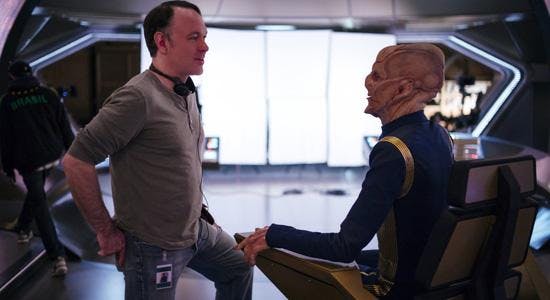
Let’s talk specifically about “Lethe.” You and Joe Menosky co-wrote the teleplay. You’re a huge Trek fan, and he’d worked on worked on multiple Treks in the past. What was the collaboration like?
I've actually never had an experience quite like this, because I'm a huge Joe Menosky fan. In fact, he had a profound impact on me as a writer growing up, because I adored his Trek work. So, I was quite nervous to meet him. I didn't know he was on staff when I came on board, so I was very, very awkward and nervous. We did some work together on polishing. We did some of those together and we really liked working together, and he suggested to Aaron and Gretchen that we write six together. That was a huge honor for me. We're very different. Joe is... he's just so mellow, man. He's just like, "Yeah, that sounds great" or "Yeah, I think that's right." He has this kind of sing-songy, easy-going quality about him that is so the antithesis of me, which is very high-strung, everything's a disaster, everything's a crisis. It's all going to implode. But I think when we mixed together, we really, really enjoyed writing.
The process was we worked individually. Joe writes his scripts on his phone, and sometimes in restaurants. He likes being in the hustle and bustle. I have to write in total silence, at work, in my office. I thought what he did was crazy, and I would stay until three in the morning, working alone in the office, and he thought that was crazy, so we're kind of weird that way. But it worked perfectly. Then we would just trade pages and we kind of "Yes, and…" each other instead of deconstruct each other. There was a lot of, I think, mutual respect for each other's voice, and I think they were very, very complementary. It was really exciting. It was terrific.
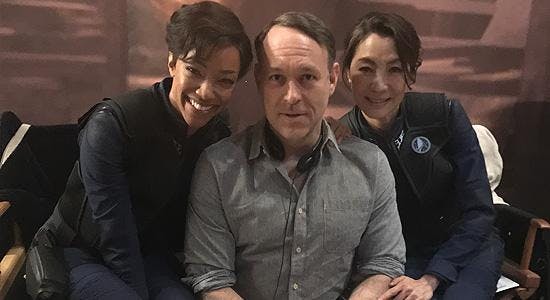
What would you say was the core, the heart of “Lethe”?
Oh, for me, the core of this episode is the A-story. It’s a father-daughter story, but it's primarily a story about an adult woman who sees the flaws of her father figure through adult eyes for the first time. That's a really profound moment when that happens in anyone's life, and I think it's a turning point moment, which is why at the end of the episode, Burnham (Sonequa Martin-Green) re-introduces herself to Tyler (Shazad Latif). I think she's reclaiming her own identity and saying, "Yeah, we haven't met before. This is really who I am." I think it's a turning point moment for the show and a turning point moment for Burnham, who I think you will see, moving forward. She is a different character than she has been for the first five episodes, which was either high-school overachieving A+ student, and then alienated, kind of goth college student, and now I think she's adult, trying to make it on her own.
We’ve heard this debated amongst the fans. How the hell do you pronounce the name of the episode?
(Laughs). Lee-thee. I believe it's Lee-thee, but that title is 100% Joe. I had some other pitches on it, but for the life of me cannot remember it. But there was something very Next Gen about that title. My title for an episode I did later in the season, it was intentionally very TOS, but I thought this episode felt a little TNG to me in certain ways. When Joe came up with that, I thought "Yeah, that works really well."
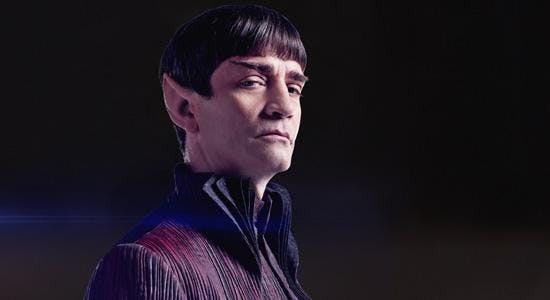
You dipped deep into canon with Amanda (Mia Kirshner), and we saw more of Sarek (James Frain). How fun and how big a responsibility is it to write these iconic characters?
It's only fun in retrospect. When you're writing super-, super-canon characters, who have been so clearly defined for 50 years, it is both a huge responsibility and a heavy, heavy weight. So, it's not fun during the process. We're very, very lucky in the show to have people like Kirsten Beyer, who is world-renowned for being a top-selling Trek novelist and has lived in Trek for 20 years professionally. She knows canon truly better than anyone on the show, by far. It was difficult, but also invaluable to have her there, because you would suggest one pitch for a story, and she'll go "You can't do that because of this…," but she helps guide you through that process. I have to give a special, special shout-out to Kirsten, who is not only a great friend, but a super-talented writer and a true advocate for Trek canon. She knows when to stretch canon and when not to. That was really, really helpful with Sarek and Amanda.
The real thing with the Sarek of it all is we wanted to explore, What was the root of the issue with Sarek and Spock that was exposed in “Journey to Babel?” That's one thing that we wanted to do. Because this is a prequel, how do we tie into that? I think in some ways, this makes him a little bit more empathetic, because he did the best he could, and then he screwed up in retrospect. As Burnham rightly calls him out, "You let me believe a lie.” But there's another element in this story with Sarek, which I think people forget, which is Vulcans feel emotion. They just repress them. And if you look at Mark Lenard's performance in Search for Spock, which is one of my favorite Trek movies, because of all the emotion in it, he is incredibly emotional in that movie. He's trying to be Vulcan and hold it in, but you can see how much this father is hurting that his son is dead, and he's trying to bring him back. He’s going to do anything. He's convincing Kirk to basically commit career suicide to go get his son, because that's more important to him than logic and reason and all those types of things.
So, we wanted to explore that Sarek feels some type of paternal guilt and responsibility for what happened with Burnham. He was the last person to talk to Burnham. Then that kind of sent her off on the path that she took, and this war happened. I think from that standpoint, Sarek feels some guilt and some shame. And that's why he's so desperate to vet the Klingons and hope that he can bring an end to the war, because he wants to start righting this wrong and help Burnham. We don't really vocalize that per se in the episode, but it is something we talked about a lot and is something that I think explains his motivations. Some people have said, "Well, that doesn't seem very Sarek." My response is, "I think it's very Sarek." There are plenty of examples in canon. As he says in Star Trek III, "I am not always logical when it comes to my son," and I think the same applies to Burnham. He clearly has a soft spot in his heart for family and for humans in general. I mean, he married two humans, for crying out loud. So, I think he is a unique Vulcan in that way, and it was interesting to kind of play around with those ideas within the confines of canon.
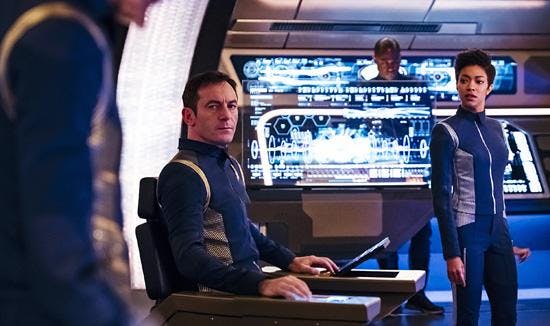
The scene with him in sickbay is, pardon the pun, fascinating. He clearly felt shame, a very human emotion.
He basically admits that earlier, exactly. When people said "That doesn't seem very Sarek"… He's on the verge of death. When you're on the verge of death and you're in pain and delusional, of course it comes out then. That's exactly when it would come out. Now that he's healing, that's when you tend to go, "No, no, I don't know what you're talking about." I think that is so interesting and why he's a complex character. In all honesty, we had a very different ending for this story originally. I had pitched a much more touchy-feely ending. They-have-the-breakthrough and they're much closer at the end of the story. But Aaron Harberts very, very wisely said "That's the wrong ending. It's not as messy and it's not complicated." What we needed the story to do is drive a wedge between Sarek and Burnham, and move Burnham closer to Lorca (Jason Isaacs). So, one father figure is replaced with another. I think that's what's the brilliance of Aaron and Gretchen. They're so, so good at looking at a story and going, "Nope, it should be this" and you go, "Right, that's what it should be." Joe is also that way with story, with Trek especially. He can go "Yeah, that's a little too mainstream, it should be this." And you're like, “Holy crap, how did you think of that?” But he's also written more episodes for Star Trek than I think anyone else but one person, so it's in his DNA.
How pleased, if you can be objective, are you with the finished episode?
This is the proudest I've ever been of anything I've ever been a part of. I mean ever.
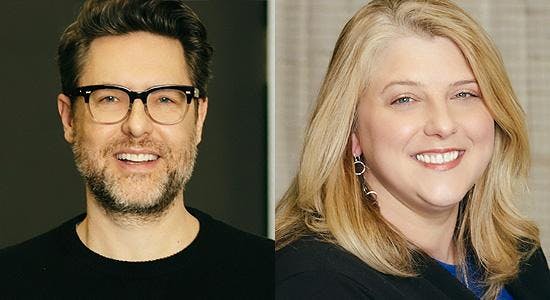
Why?
Because the collaboration with not only Joe, but Aaron and Gretchen and the entire writers' room, yielded a story that I feel had a beginning, middle and end, but also pretty deftly maintained serialized elements of the story. I don't think there's a wasted moment in the episode. Even the jogging sequence with Tilly (Mary Wiseman) and Burnham relates to Sarek and Burnham, and that's why there's that final scene with Tilly and Burnham at the end. I think there's more humor in this episode than any other one, which I'm really proud of. I think that Doug Aarniokoski directed the hell out of this episode. It looks beautiful. I think Jeff Russo's music is stunning and I think literally every performance is just spectacular. We’re on a set and working with this group of actors, who are so collaborative, and so intelligent and want to push the work to be deeper than just, "Hey, we're making a sci-fi show." We're trying to make a show that shines a light on the human experience and, like I said, I love the fact that this is a complicated story about a parent and child. I've had complicated relationships with my parents. Joe has too. I think virtually everyone in our writers’ room has. So, it was really interesting to tap into those universal emotions.
And I'm super, super-proud that we got to deal with things like racism and isolationism, which I think are massively important issues that we're dealing with in the world. I think it was really, really important to show that not just uneducated, reactionary people can be racist and close-minded, that the most intelligent characters in Star Trek history can fall prey to those instincts as well. That's important, because I'm always stunned when I see super-well-educated people on TV espousing hate and isolationism and xenophobia, which is deeply troubling and seems to be spreading today.
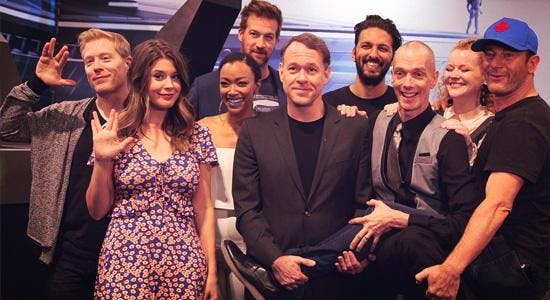
How excited are you that Discovery will have a second season?
I am both excited and nervous, because it's overwhelming and I have never worked harder on a show than on this one. So, there's a part of me that is like, "Oh no, it's coming." But I'm super, super-excited, and I'm super-excited to tell different types of stories. Now that we've really found out what the language of the show is, and the actors have really fallen into their roles and they know who they are as characters, I think it's gonna be really, really fun.
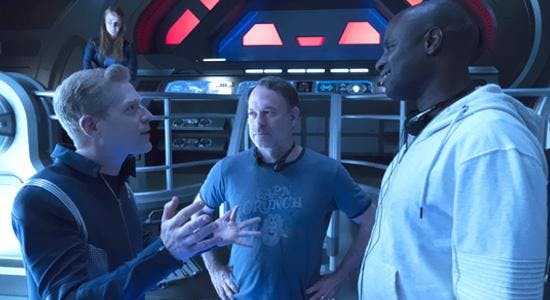
Going back to “Lethe,” any final thoughts on the episode?
It was hysterical when Mia Kirshner got cast as Amanda. We bumped into each other in the makeup trailer, and I said "You're not going to remember this, but 20-some odd years ago, 25 maybe, when I was in college and you were a kid, I was assigned by CAA to be your driver,” That’s what I used to do to make extra money, back in 1990 or something. Her mouth just dropped open. She goes, “Wait, what?" I said "You were at this hotel…," and I started describing the situation. She's like, "Oh my God, I remember that." I was like, "Yeah, I was your driver 25 years ago." It just blew her mind. Flash-forward a quarter of a century later, we're on the set making Star Trek.
Star Trek: Discovery streams Sunday nights on CBS All Access in the U.S. and Space Channel in Canada. The series streams on Mondays on Netflix in the rest of the world.




